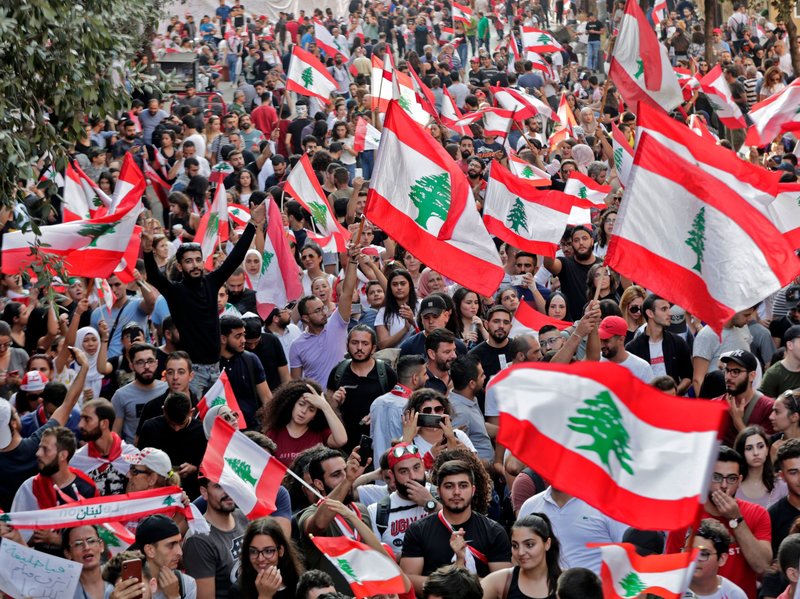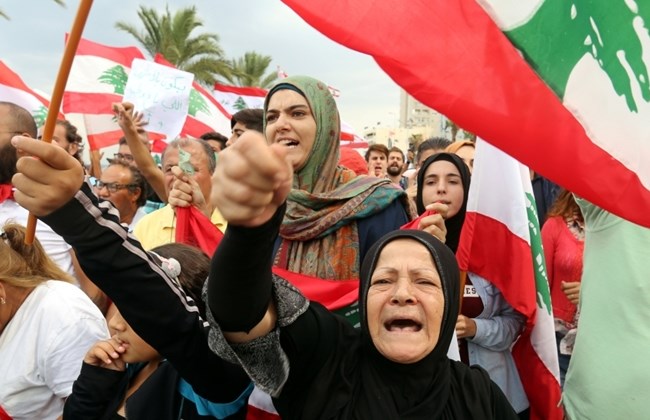www.aljazeerah.info
News, October 2019
Archives
Mission & Name
Conflict Terminology
Editorials
Gaza Holocaust
Gulf War
Isdood
Islam
News
News Photos
Opinion Editorials
US Foreign Policy (Dr. El-Najjar's Articles)
www.aljazeerah.info
|
Editorial Note: The following news reports are summaries from original sources. They may also include corrections of Arabic names and political terminology. Comments are in parentheses. |
Lebanese Protesters Do Not Trust Traditional Leaders, Demand a Technocrat Government
October 24, 2019
Editor's Note:
Watching interviews with Lebanese protesters in Arabic media, it's become clear that they no longer trust the corrupt traditional sectarian system of government, which brought the country to its knees economically, spreading poverty among vast categories of people.
As a result, they have been calling for a technocrat government, without any association with any of the current sectarian parties, to save the country. They also demand the restoration of the looted funds and putting thieves on trial.
 |
 |
| Lebanese protesters flying the national flag alone, which is a departure from flying party and sectarian flags and symbols in the past | |
***
Protesters Continue To Fill Streets Of Lebanon, United By Their Calls For Change
NPR, October 22, 2019
For days, people have gathered in the central squares of cities across Lebanon. They've chanted, they've sung, they've carried cheeky signs.
What do they want? Wholesale change in their political system. When do they want it? Now.
The government took notice, and announced a raft of changes: No new taxes. Halving government officials' salaries. Privatizing the telecom industry because cellphone plans in the county are so expensive. Fast-tracking licenses for new power plants, as there are daily electricity cuts in most Lebanese cities.
If the government had hoped that the plans they announced would get the protesters to go home, it didn't work. Instead, protesters continue to demand that Prime Minister Saad Hariri resign.
"They just go up now on TV and give a speech just to shut us up," said 22-year-old Sophie Akkouri. While her friends are moving abroad for better opportunities, she's protesting in Beirut because she wants change in her own country. "We're not going. We're going to stay here until they all resign."
The demonstrations began as a vehement response to the government's new tax proposals, including one on phone calls that take place over WhatsApp. But the public pressure has grown into an impassioned censure of Hariri's government itself.
These are the largest demonstrations in the country since 2005, when Prime Minister Rafik Hariri – Saad's father — was assassinated in a car bombing in Beirut. That triggered street protests against the Syrian military presence in the country, demonstrations known as the Cedar Revolution. Syria subsequently withdrew its forces from Lebanon.
Lebanon's political system allocates power among the country's three largest religious communities — Christian, Sunni and Shia. The system has been credited with keeping the country fairly peaceful since 1990, but it's now criticized as spawning corruption and enshrining a ruling elite.
The protests have the feeling of a carnival, and they're uniting the country across sectarian divides, a sensation new to many of those participating.
"I feel euphoric," said Mohammed Ballaghi, 33. "For the first time, I see the people of my country standing united together against this tyranny. I'm very proud to say I'm Lebanese because the Lebanese people are not scared anymore. They are not sectarian pieces of [expletive] anymore."
NPR International Correspondent Daniel Estrin contributed to this report from Beirut.
Top banking official: operations to fully resume when Lebanon crisis ends
The Daily Star, October 24, 2019
BEIRUT:
Banks in Lebanon will stay closed for safety reasons until stability returns, the banking association said Thursday, as protesters flood the streets demanding the government resigns.
A senior banking official told Reuters he hoped the country's political crisis would end soon and that operations would fully resume once it does.
"Once normalcy is restored, we are very confident that we can resume servicing our customers in full capacity," said Salim Sfeir, chairman of ABL and Bank of Beirut. "We have operated in the past in the darkest and most difficult moments, and never defaulted or neglected our obligations."
Banks have shut their doors for six working days.
They will remain closed Friday for the safety of customers, employees and properties, the ABL said. They would provide month-end wages via ATMs, it said in a statement, carried on the state news agency NNA.
Prime Minister Saad al-Hariri as part of his emergency reform package also said the banking sector would shell out 5.1 trillion Lebanese pounds ($3.4 billion) to help cut the 2020 budget deficit, including through a tax hike on profits.
***
Share the link of this article with your facebook friendsFair Use Notice
This site contains copyrighted material the
use of which has not always been specifically authorized by the copyright
owner. We are making such material available in our efforts to advance
understanding of environmental, political, human rights, economic,
democracy, scientific, and social justice issues, etc. We believe this
constitutes a 'fair use' of any such copyrighted material as provided for
in section 107 of the US Copyright Law. In accordance with Title 17 U.S.C.
Section 107, the material on this site is
distributed without profit to those
who have expressed a prior interest in receiving the included information
for research and educational purposes. For more information go to: http://www.law.cornell.edu/uscode/17/107.shtml.
If you wish to use copyrighted material from this site for purposes of
your own that go beyond 'fair use', you must obtain permission from the
copyright owner.
|
|
|
|
||
|
||||||


